Didn’t watch the public impeachment hearings? Here are the seven biggest surprises
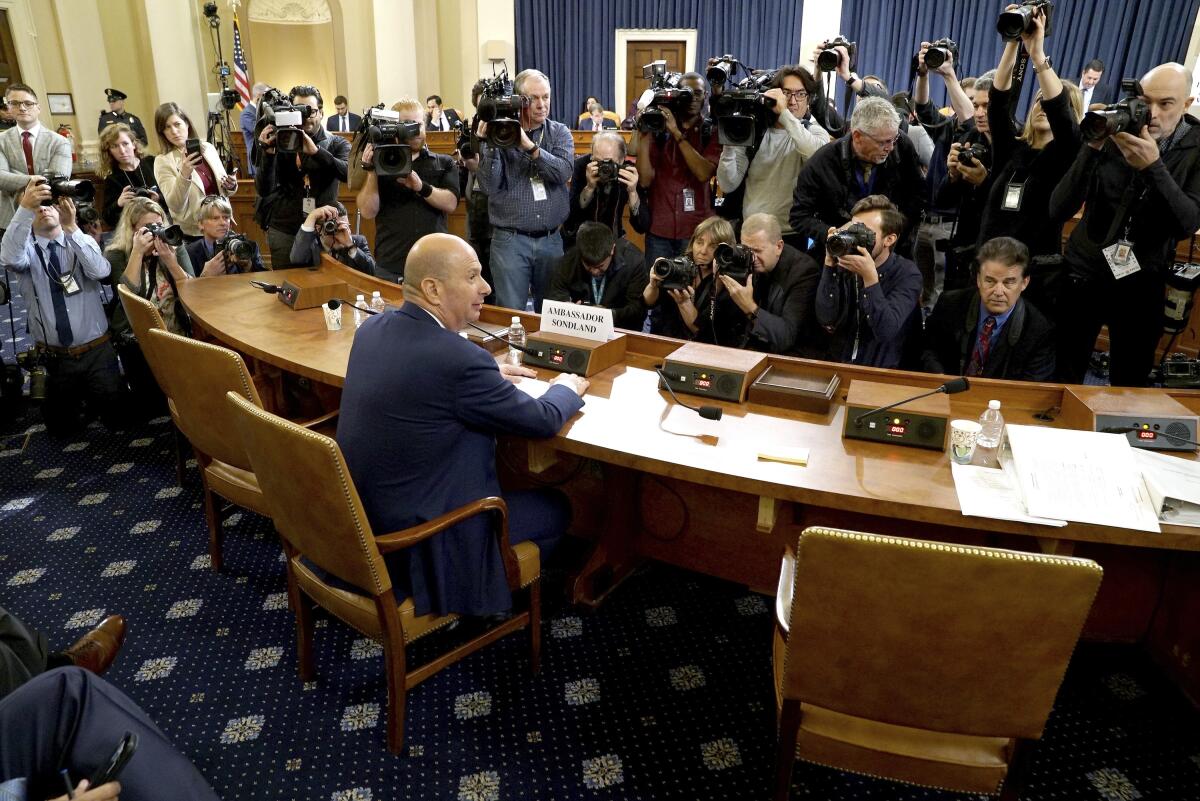
WASHINGTON — Twelve witnesses, dozens of hours of testimony and thousands of pages of documents — all spread over five long days of historic impeachment hearings.
The House is weighing whether to bring articles of impeachment against President Trump for pushing Ukrainian President Volodymyr Zelensky to open investigations into Trump’s political enemies, including an energy company that once employed the son of former Vice President Joe Biden and a debunked conspiracy theory that Ukraine, not Russia, interfered in the 2016 U.S. election.
Without a public announcement that Ukraine would open the investigations, Trump refused to agree to a White House meeting with Zelensky. Trump also blocked the release of nearly $400 million in congressionally approved aid to help Ukraine fight its war over Russia’s annexation of Crimea. Trump’s request for the investigations — which he called a “favor” — came during a July 25 phone call between the leaders, which prompted a whistleblower’s complaint and launched the impeachment inquiry.
Though many of the basics of the investigation were known before public hearings started Nov. 13, several new things came to light. Here are seven of the most important things we learned.
The July 26 call
Much has been made of the July 25 call between Trump and Zelensky. But the public hearings revealed for the first time that there was also a significant call the day after.
Senior U.S. diplomat in Ukraine William B. Taylor Jr. supplied the first bombshell of the hearings. He testified that after his deposition a staff member informed him about a July 26 cellphone call that the staffer overheard between Ambassador to the European Union Gordon Sondland, who was eating with the staffer at an outdoor restaurant in Kyiv, and President Trump.
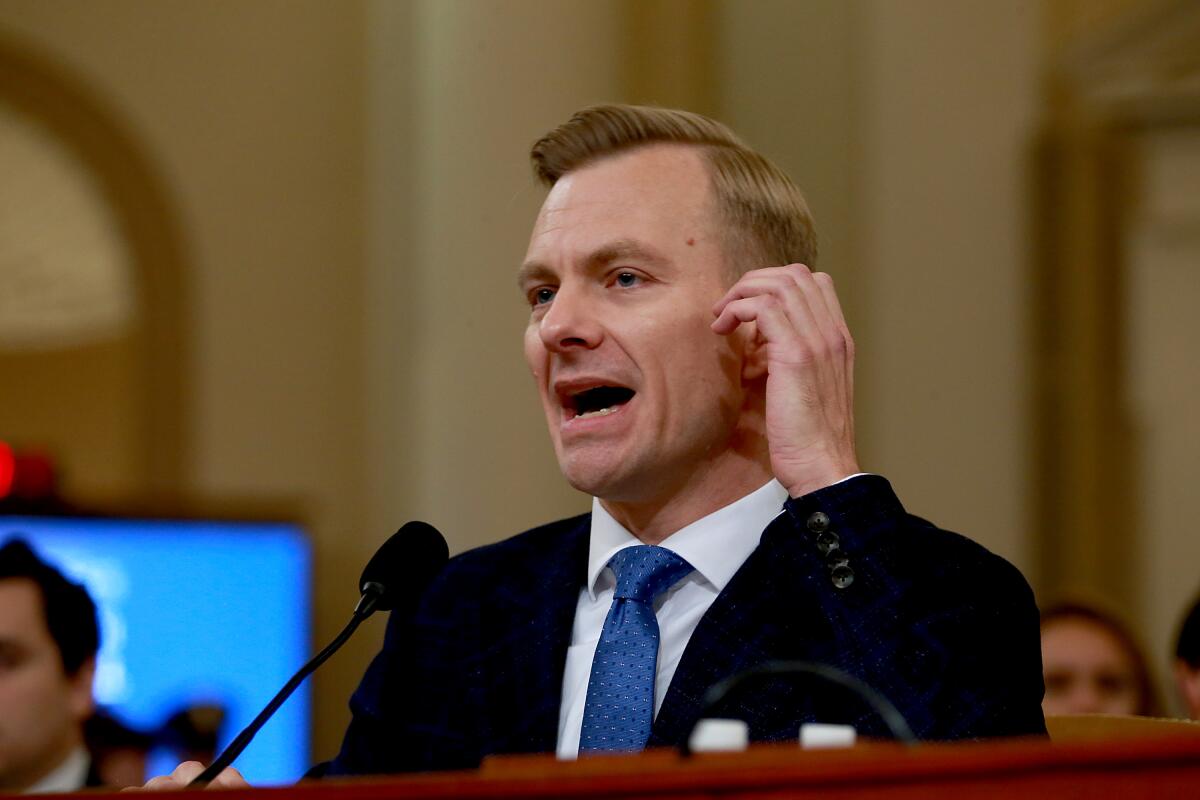
The staffer at the U.S. Embassy in Ukraine, David Holmes, was deposed and called to testify publicly, where he described hearing Trump’s voice booming from the phone loud enough so he could hear both sides of the conversation. He said he heard Trump ask Sondland whether Zelensky had agreed to do the investigations.
“[Sondland] said, ‘Oh yeah, he’s going to do it. He’ll do anything you ask,’” Holmes said, adding that Sondland then said Zelensky “loves your ass.”
Trump has said he doesn’t remember the call with Sondland. The call not only drew attention because of the content, but because Sondland spoke with the president via an unsecured line in a public space in a country at war with an adversary.
Sondland testified that the White House confirmed to him that the call took place and the call didn’t stand out to him personally, but he doesn’t dispute Holmes’ description of the call.
But he and Holmes disagree on what occurred after the call. Holmes said that after the call was over, he asked Sondland what Trump thought about Ukraine. He said Sondland replied that Trump only cared about the “big stuff.” Asked what that was, Sondland said Trump cared more about the investigations into the Bidens than about U.S. policy toward Ukraine, according to Holmes. Sondland said he doesn’t remember talking with Holmes about the Bidens or Burisma, the energy company that employeed Hunter Biden.
The July 25 emails
So, we knew about the July 25 call. But not about the July 25 emails.
Ukraine may have known that the Trump administration was withholding aid the same day of the July 25 phone call between the world leaders, Laura Cooper, a Pentagon official specializing in Ukraine, told lawmakers. She disclosed for the first time the existence of two emails received by her staff, and a call they received from the Ukrainian Embassy. Each described Ukrainian officials inquiring about the U.S. aid.
When Ukrainians learned about the delay is crucial because Republicans argue that there could be no quid pro quo if Ukrainians were not aware that the aid was being withheld. They say Zelensky did not know the aid was delayed during the July 25 call. And the topic did not come up during the call, according to a White House account and witness testimony.
Some witnesses had testified that the Ukrainian government learned the aid was being withheld in August. But Cooper was the first witness to present evidence they may have known during the call, or hours later, when the emails were sent.
The emails and phone call don’t definitively show what Ukraine was aware of a delay. But Cooper said it would have been unusual for the embassy to suddenly start asking about the status of the aid unless they had a specific concern.
The aid was released Sept. 11, after Congress began looking into the situation and the whistleblower filed a complaint about it.
Sondland’s surprise reversal
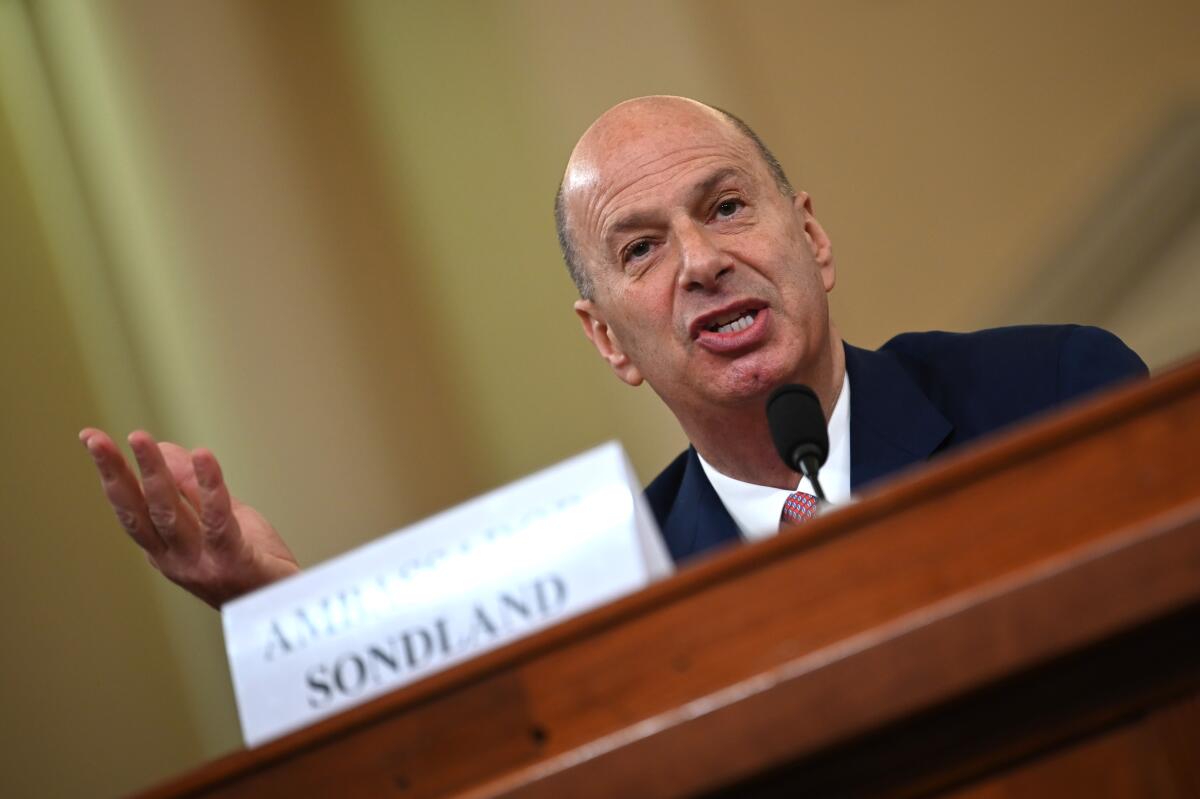
Gordon Sondland was a witness specifically requested by Republicans, but he didn’t help their case much.
Sondland, who donated $1 million to Trump’s inauguration, had come across in his deposition as defending the president and disputing the idea that there was an improper quid pro quo.
But with multiple other witnesses contradicting his testimony, Sondland — who had already been forced once to revise his deposition amid discrepancies with others — changed his tune even more during his public appearance.
“Was there a quid pro quo?” he asked. “The answer is yes.” He confirmed that a White House meeting with Trump was contingent upon Ukraine announcing the investigations he wanted.
Sondland went on to agree with Democrats that it was wrong for the president to ask a foreign government to investigate a political rival. Then he implicated a list of other senior administration officials who he says were aware of the campaign, including Vice President Mike Pence, Energy Secretary Rick Perry, Secretary of State Michael R. Pompeo, acting White House Chief of Staff Mick Mulvaney and others.
“Everyone was in the loop,” he said. “It was no secret.” He said Trump directed him and others to work with his personal attorney, Rudolph W. Giuliani, who led the effort to push Ukraine to investigate Trump’s political foes. “We followed the president’s orders.”

During Wednesday’s House impeachment inquiry hearing, Gordon Sondland said he ‘worked with Mr. Rudy Giuliani on Ukraine matters at the express direction of the president of the United States.’
Sondland also blew a big hole in one of the key GOP defenses of Trump: That he withheld the aid because he was concerned about Ukraine taking steps to root out its corruption.
Sondland said Zelensky “had to announce the investigations. He didn’t actually have to do them, as I understood it.” That left the impression, from the witness closest to Trump, that the president really only cared about the PR value of the investigations into his rivals, not whether they were actually carried out.
No answers about why the aid was withheld
The hold on nearly $400 million in Ukraine aid was announced by an Office of Management and Budget staff member who said it was being done at the direction of the president. But nearly every witness testified that — despite persistent efforts — they never got a full explanation of why the aid to Ukraine was withheld or why it was eventually restored.
Most, including Sondland, said they presumed it was related to the push for investigations. But Sondland testified that Trump never directly connected the two things.
It remains a hole in Democrats’ case. House investigators note that they tried to interview the high-ranking officials who might be able to connect the dots, like Mulvaney. But the White House has ordered them not to comply with subpoenas or requests for testimony.
The victim
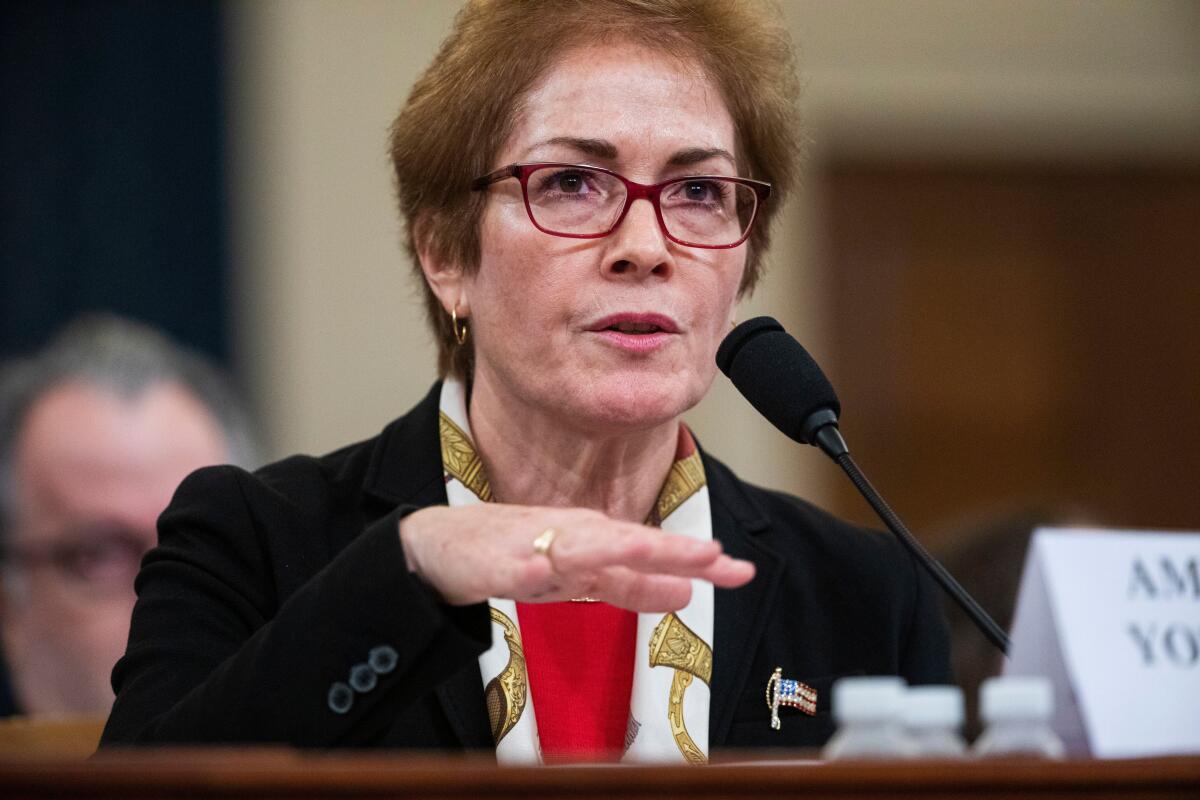
Former U.S. Ambassador to Ukraine Marie Yovanovitch gave Democrats the sympathetic face they needed as she described her confusion and despair at being recalled in May amid a flurry of unfounded rumors that she was anti-Trump and corrupt. The allegations, which originated with a former Ukrainian official who has since renounced them, were amplified by Giuliani, the president’s family and conservative pundits.
She said she understood the president’s right to replace an ambassador at any time, but in one of the hearings’ most emotional moments, she added, “I do wonder why it’s necessary to smear my reputation falsely.”
Then, as Yovanovitch testified about being smeared, Trump took to Twitter to criticize her, claiming without evidence “that everywhere Marie Yovanovitch went turned bad,” disparaging her previous service in Somalia as well as her work in Ukraine.
The tweet drew a rebuke from committee Chairman Rep. Adam B. Schiff (D-Burbank), who read it aloud and said, “We saw today witness intimidation in real time.” He warned that intimidation could be its own article of impeachment. Even many Republicans distanced themselves from the tweet.
The dual diplomacy channels
The fact that Ukraine policy had been hijacked by Trump loyalists was known previously, but the public hearings brought that into stark relief.
Witnesses provided plenty of evidence that Giuliani was directing the “three amigos” — Sondland, Perry and former special envoy to Ukraine Kurt Volker — to push Ukraine to commit to the investigations.
Fiona Hill, Trump’s former Russia expert at the National Security Council, testified about the two tracks: one involving national security and foreign policy, and the separate one set up by Trump to fulfill what she derided as a “domestic political errand.”
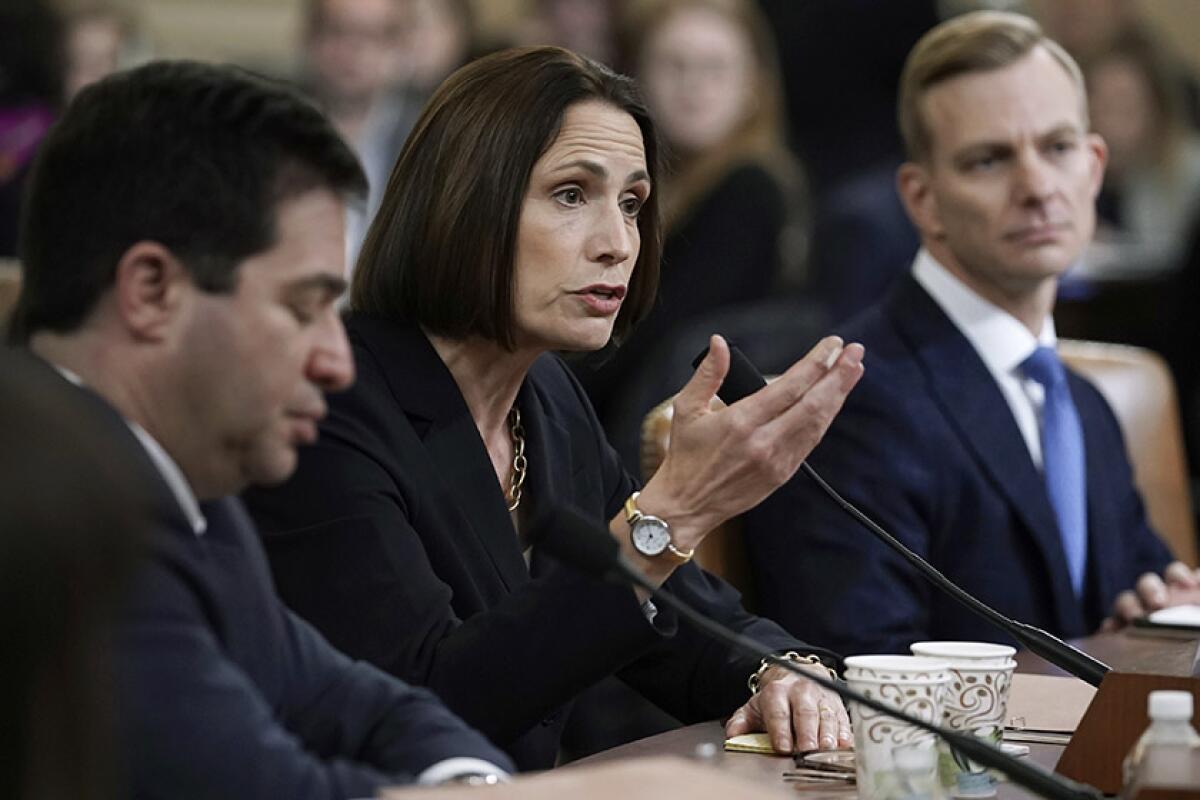
Sondland said that Trump instructed in May that Giuliani was their point person on Ukraine.
“When the president says, ‘Talk to my personal attorney,’ and then Mr. Giuliani makes certain requests or demands, we assume that’s coming from the president,” Sondland said.
It doesn’t look like many minds were changed in the House
While Democrats appear closer to impeaching Trump, the hearings did not reveal any cracks in Republican support.
GOP committee members derided much of the evidence witnesses presented as secondhand, and portrayed the entire proceedings as a partisan circus aimed at overturning the results of the 2016 election.
Even Rep. Will Hurd, a retiring Republican from Texas thought to be a potential swing vote, said Thursday he still isn’t on board.
At the end of the last hearing, Hurd criticized the Trump administration for “bungling” foreign policy, but indicated that he is not convinced that an impeachable offense occurred.
“An impeachable offense should be compelling, overwhelmingly clear and unambiguous. And it’s not something to be rushed or taken lightly,” Hurd said. “I have not heard evidence proving the president committed bribery or extortion.”

Rep. Will Hurd (R-Texas) says he’s not convinced that an impeachable offense occurred.
More to Read
Get the L.A. Times Politics newsletter
Deeply reported insights into legislation, politics and policy from Sacramento, Washington and beyond. In your inbox three times per week.
You may occasionally receive promotional content from the Los Angeles Times.











